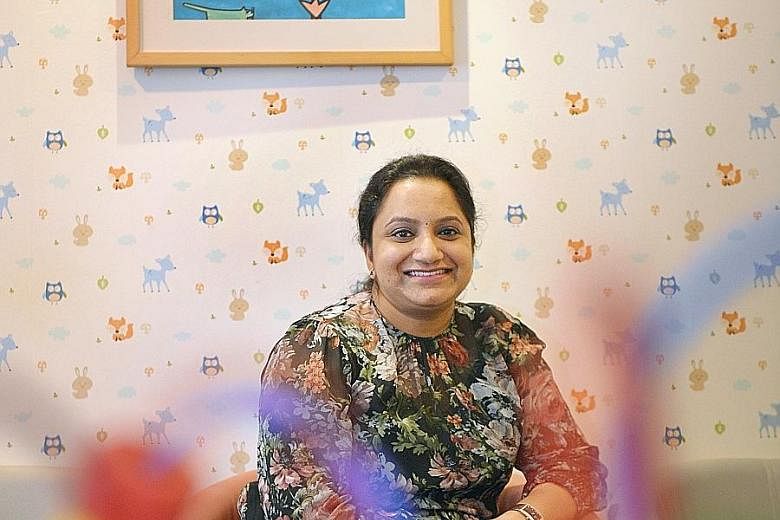Q I specialise in paediatrics because...
A I love being around children. I feel like a detective when I am trying to identify the medical condition of a child who is unable to fully communicate how he or she is feeling.
It gives me great satisfaction to see children recover quickly from their illnesses.
Q If I were to give an analogy for what I do, I would be...
A Like a friend to the family of my patient, as I feel it is my duty to allay the anxiety and fears of the child and the parent while treating the child.
Q I come across all types of cases...
A From patients getting their childhood vaccinations to those suffering from common childhood illnesses such as asthma, eczema or constipation, to children grappling with severe learning difficulties, autism, ADHD (attention deficit hyperactivity disorder), epilepsy and severe neurodisability.

Q A typical day for me would be...
A One that starts at 6am. As a mother of two, I have to find a balance between work and family.
In the morning, I will get the boys ready for school, pack our lunches and leave for work.
Before my clinic starts at 8.30am, I will see my patients in the wards.
In addition to seeing patients at the clinic, I review their test results, talk to their parents and inquire about the child's progress.
I end my clinic at around 5.30pm and go home to spend some quality time with my family.
I will help the boys with their homework and chat with my husband. We will then have dinner together and talk about how our day went.
-
BioBox
-
CHITRA GANGADARAN RAMALINGAM
Age: 40 years old
Occupation: Specialist in paediatric medicine and consultant, Raffles Children's Centre
-
As the top A-level student in Tirupattur in Tamil Nadu, she was offered a college scholarship by the Tamil Nadu government.
"I chose to study medicine as I was fascinated by how doctors are able to help sick people get better," she said.
Her interest in paediatrics blossomed during her internship at the Institute of Child Health in Chennai.
Dr Chitra did her specialist paediatric training at several hospitals in Britain after completing her medical degree at Madras Medical College in Chennai.
At the end of last year, she moved to Singapore with her children to join her husband, Dr Vijayaraj Thirunavukarasu, an ear, nose and throat surgeon at Ng Teng Fong General Hospital.
Prior to moving here, she worked as a consultant in paediatric medicine at New Cross Hospital in Britain.
She and her 43-year-old husband, who are both British citizens, have two boys, aged 13 and 11.
Q One little known fact about my field is that...
A Not all behavioural problems in children have a medical diagnosis. They could be due to problems in the environment in which the children are brought up, and then we may need to educate the family as a whole.
Likewise, not all medical conditions or diagnoses are clear when the doctor first sees the child. For example, a child with speech problems could have a simple condition like a tongue-tie or a more serious condition like a speech disorder, learning difficulty, autism spectrum disorder or verbal dyspraxia.
Q An interesting case that I came across while working in Britain was...
A When I saw a six-year-old child who had severe eczema and had been struggling in school for a few years. While examining her, I noticed she had mild abnormal facial features. Her mother had thought it was because of the eczema on her face.
I arranged for the girl to take some genetic tests, which showed she had a rare form of Down syndrome called Mosaic Down syndrome. This gave us the answer to her underlying learning difficulties and I was able to arrange for additional help for her at school.
Q Patients who get my goat are...
A Parents who do not ensure that their child completes the course of medication or do not follow the instructions given to them, but yet, expect improvement in their child's illness.
I like patients and parents who are keen to work with the doctors. I find it really helpful when parents keep a diary of the events that have happened to the child. For instance, the parent of a child with recurrent abdominal pain for a few months who describes each episode and lists the possible trigger factors.
Q The things that put a smile on my face are...
A When children get better and I see them feeling happy and becoming more active. Also, when I receive cards and letters of appreciation from the children and their families.
Q It breaks my heart when...
A I have to tell parents about a life-limiting condition that their child has.
Q My best tip is...
A Spend as much time as possible with your children. You can play games, read or talk to them to help with their general development and improve their social skills.
Praise your children and reward them for good behaviour, and also praise them for their effort, rather than just good results.
Q I wouldn't trade places for the world because ...
A It gives me a great deal of satisfaction to be able to help parents deal with the illnesses of their precious little ones, and be there to comfort and reassure the family.
The fun part of my job is interacting with the children, playing with them while also concentrating on the medical assessment. The most challenging part is not just gaining the confidence of the child, but also the parents and the whole family.

